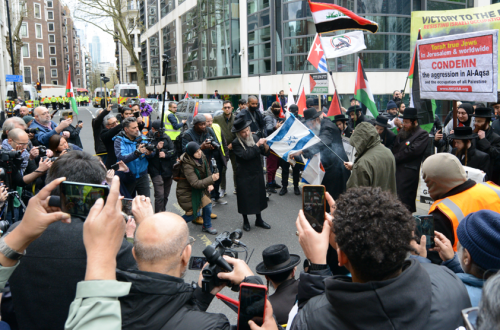As a fan of alternate histories, I was intrigued to hear that the NUS was keen to ban Muslim headscarves back in the 1970s. (I apologise for not being able to find a link for this story, which I think was raised by a Harry’s Place commenter.) What if things had taken a different path, and Islamism rather than Israel was the bugbear of both the radical and liberal left?
Instead of annual discussions of boycotts, the UCU might be trying with equal zeal to implement various measures against Islamic extremism. As well as outlawing speakers with extreme views it might, rather like some governments in Europe, have ended up trying to pass motions to ban the niqab and even the hijab from campus. It would be easy to imagine that, faced with such a sustained focus on Islam, even Muslims who thought the veil unnecessary and appreciated that *some* women were being coerced into wearing it, might begin to feel beleaguered. Some might resign, others, worried about their jobs, wouldn’t but would find the atmosphere within the union unwelcome. On the activists’ list ‘Islamism’ would slip into ‘Islam’ and fair points about hate preachers would drift into discussions of (for example) Cambridge being under the thumb of terrorists. When raising their anxieties Muslim UCU members would get accused of being apologists for HuT, or of wanting to close down debates about human rights abuses.
University societies might begin to devote whole weeks to campaigning against Islamism. Clearly some of their targets would be valid ones – yet the relentless and exclusive focus on Islam(ism) as the problem would make Muslim students feel still more beleaguered. If they tried to point out a counterexample, or identify an exaggerated claim, they might get shouted down, or accused of being terrorists.
More resignations follow, But the UCU doesn’t seem that interested, and decides to arrange a conference on the subject of combatting extremism. One invited speaker has been accused of stirring up hatred against Muslims in his own country, of implying that bad things will happen to them if they don’t denounce extremism, of suggesting that should move to countries more compatible with their (supposed) views. Although he claims to have Muslim friends, he said ‘Muslims are savage’ in an online discussion. But the UCU still doesn’t seem that concerned.
Then it turns its attention to a Working Definition of anti-muslim bigotry. The definition cautioned against treating Muslims as a monolithic group, and mentioned various possible symptoms which might, taking the overall context into account, be seen as bigotry. Some were easy – burning down a mosque for example. But some were more marginal, such as condemning halal slaughter or scrutinising the teachings of Islam with far more intensity than the teachings of Christianity or Judaism. The UCU decided to pass a motion repudiating this definition, claiming it was being used to shut down discussions of animal welfare and homophobia on campus.
I started thinking about this hypothetical scenario following the debate in the comments to this post. It was suggested that this article (pdf), written in response to anxieties about the impact on Jewish students of the anti-zionist atmosphere on some campuses, amounted to a call for freedom of speech to be closed down in universities. But it seems fair to make a distinction between what is acceptable in a particular physical environment housing a clearly defined community, a university, and, say, the blogosphere. Passionate pro-Palestinian advocacy (which may slip into antisemitism) and passionate anti-Islamist advocacy (which may become contaminated by anti-muslim bigotry) have a far more serious impact if they are a constant part of one’s physical environment. You can’t just press ‘x’ to get rid of hostile posters etc in your working environment in the way you can if you visit an uncongenial blog.
It isn’t my intention to pit anti-muslim bigotry and antisemitism against each other in any way – I blog about both topics here. I just think it’s useful to use defamiliarisation (a favourite sf technique) as a way of encouraging people to think afresh about what the UCU is doing.


